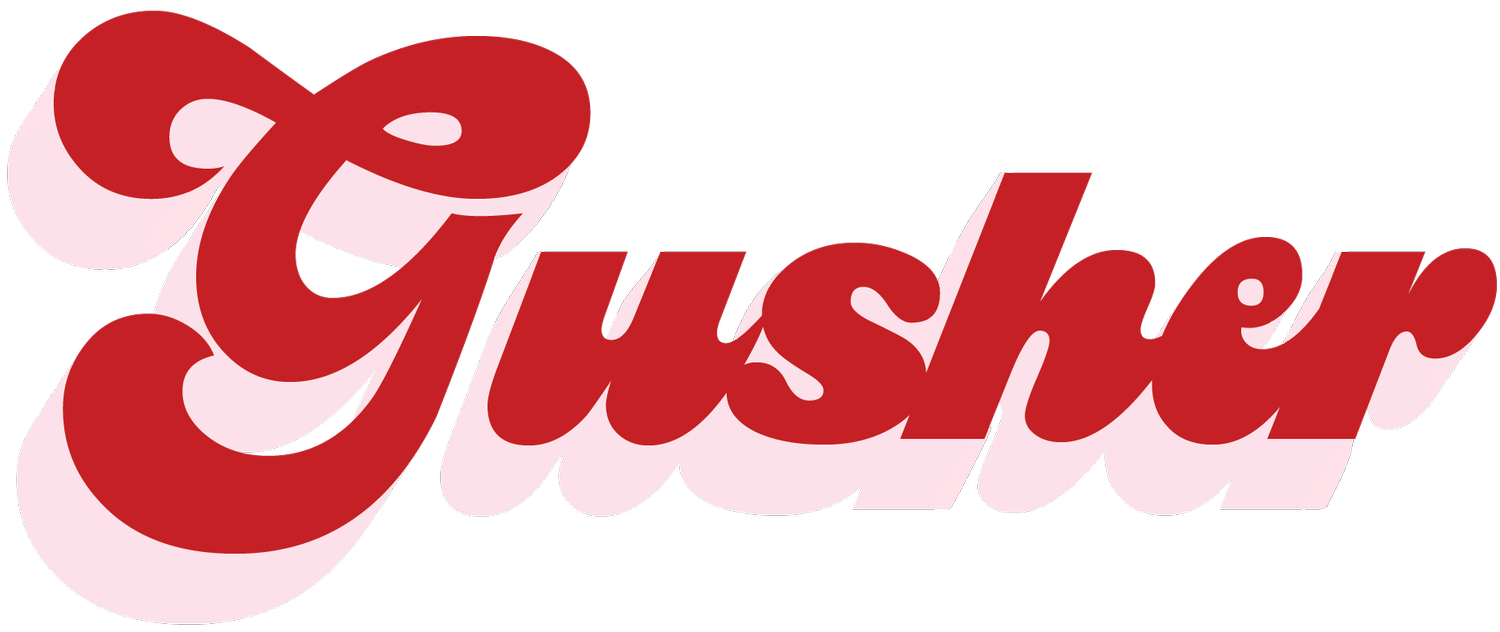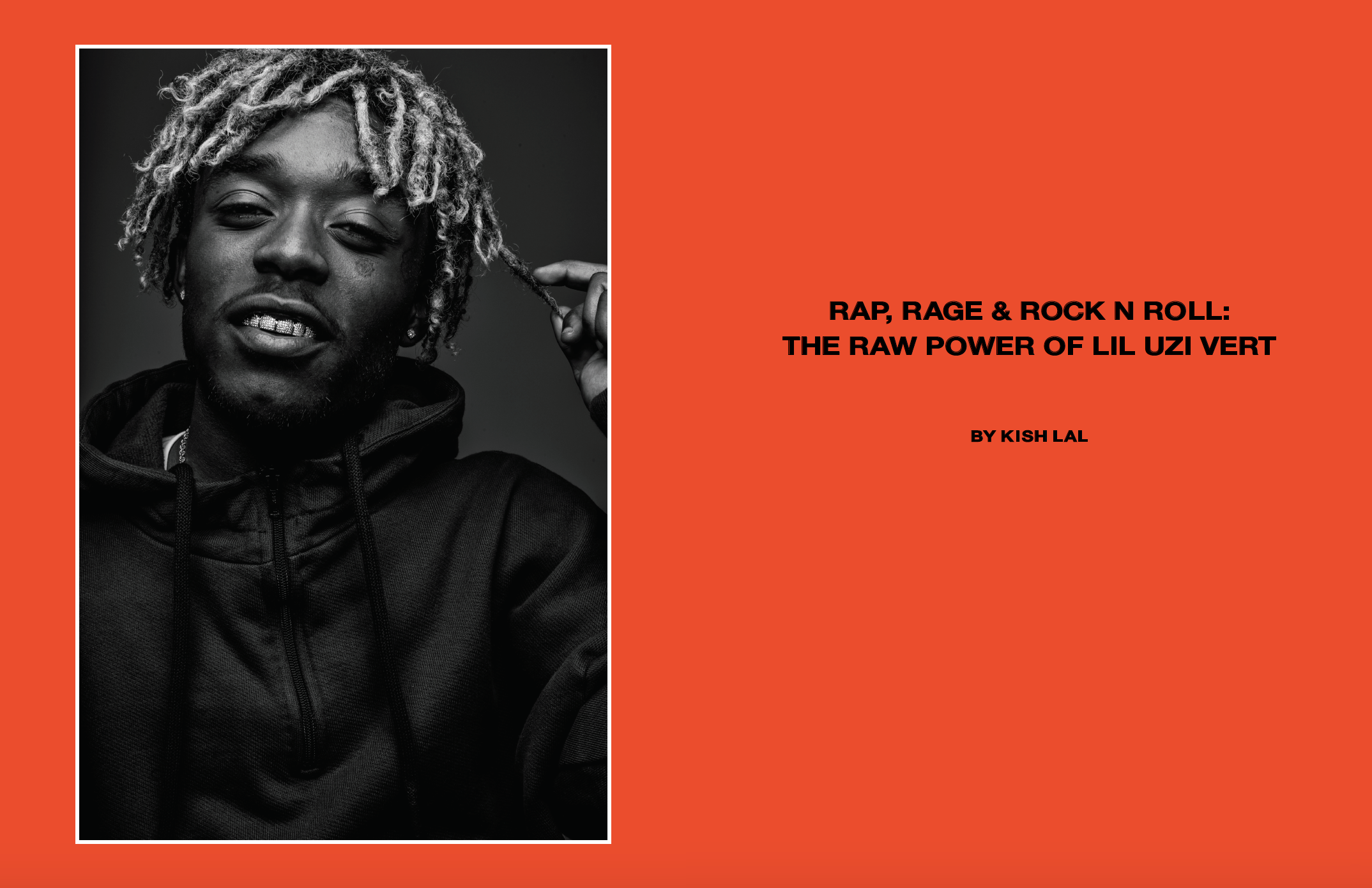Words by Kish Lal
* This article originally appeared in Issue 2 of Gusher Magazine - buy a copy here *
In 2015, at the end of his headlining set at Glastonbury, Kanye West looked out into the crowd and declared, "You are watching the greatest living rock star on the planet." In 2017, on Playboi Carti’s single "Woke Up Like This", Lil Uzi Vert croons repeatedly, “I’m a rock star.” Rappers crowning themselves rock stars is hardly anything new, but in 2017, hip hop culture has latched on to the idea more literally than ever before – no one more so than 23-year-old Atlanta rapper and iconoclast, Lil Uzi Vert.
In a 2016 interview with radio station Hot 97, Lil Uzi Vert refused to rap over a DJ Premier beat, instigating a conversation between himself and the radio host Ebro about the disconnect between the new school of rap and ‘old heads’. Uzi was adamant it wasn’t the right sound for his style and in that same interview spoke about being a rock star not unlike Marilyn Manson or GG Allin. But the conversation didn’t end there, with hip hop fans taking to Twitter to voice their anger at what they perceived as Uzi’s apparent disrespect for the genre and scene responsible for his success. In an article for DJ Booth, writer Yoh weighed in on the controversy, writing “If Uzi was at a rock radio station and refused [to rap], pulling the rock star card, it would be no big deal, but you're at Hot 97. This is rap radio, you wouldn't be here if you weren't a rapper.”
But what makes a rock star is no longer defined simply by genre. Now, it extends to attitudes, fandom and influence. After all, what is a rock star without the sass and the attitude? Uzi’s charm is in the way he carries himself, whether it’s his cheeky antics at the VMAs or his disillusionment with fame during interviews.
This wayward attitude was present before the release of his debut studio album, Luv Is Rage 2, where it seemed Uzi was just as disinterested in making music as he was in fame. The album had no specified release date, and when asked about the long-awaited record, Uzi infamously replied that the album was only “one per cent finished”. Conversely, producer Mealey Raw spoke to XXL and said that he and Uzi had been spending all day and night working on the album. While Lil Uzi Vert's behaviour epitomizes the disenchanted superstar, he also has his earnest moments, exhibiting an enthusiasm for music that serves as a reminder of why be begun making music in the first place.
For Instance, when speaking with Zane Lowe for Beats 1 this year, Uzi revealed his bubbling admiration for Hayley Williams from Paramore: ““She’s like the best,” he said. “It’s hard to top that.” He even posted a video of himself jamming out to Paramore’s “Ain’t It Fun” in his car. Then there’s his well-documented adoration of Marilyn Manson, with whom he’s confirmed to be working on an album with. Manson spoke with Consequence of Sound on the subject saying, “[Uzi] wants to do a rock album next, and I would love to see that happen because I think that he could make a new thing." When it comes to his own ambitions, Uzi doesn’t strive to be the next Tupac or Biggie, instead counting fellow genre outliers Kanye West and Pharrell Williams as influences.
Luv Is Rage 2 is a testament to Uzi's desire to go beyond the boundaries of hip hop. On Soundcloud, Uzi tagged "XO Tour Llif3", the lead single off the record, as “alternative rock”. On the track, Uzi croons in a way that feels reminiscent of hardcore emo band From First To Last. Similarly, the bittersweet “The Way Life Goes” echoes Fugazi and Rites Of Spring’s Guy Picciotto’s singing style.
His idolisation of Manson and GG Allin undeniably spills into the way Uzi performs. He smirks as he tells Ebro in that same Hot 97 interview how he crowd surfs and how wild it truly gets in the mosh of a Lil Uzi Vert show. Aesthetically, his purple dreads, septum piercing and custom Marilyn Manson chain all serve as small hints to his penchant for alternative rock and punk.
But the synergy between punk and hip-hop, especially in regards to Uzi, runs deeper than aesthetics. In an interview with Pigeons and Planes, Tom Delonge, of Blink 182 fame, said it best— “Hip-hop, like punk, was from the streets. It was always more of an emotional vehicle than a musical one. So it makes sense that you would someday see them aligned with each other.” If emo epitomizes the melodramatic existential malaise shared by teenagers the world over, then Lil Uzi Vert takes that and transforms it into something palatable and fresh for hip hop’s current domination. People who listened to American Football, Taking Back Sunday and Dashboard Confessional during adolescence have grown up, and Uzi’s take on anxiety, heartbreak and angst feels familiar yet modern, allowing for fans in their early 20s to find comfort in his music.
"If emo epitomises the melodramatic existential malaise shared by teenagers the world over, then Lil Uzi Vert takes that and transforms it into something palatable and fresh for hip hop’s current domination."
But Lil Uzi Vert isn’t just a guilty pleasure to satisfy nostalgia – he’s also exploring black pain and vulnerability, something missing from emo and pop punk which has been predominantly occupied by white, middle-class men. In an article for Pitchfork titled To Be Young, Angsty, and Black: On Rap’s Emo Moment, Briana Younger brilliantly writes on how while she listened to bands like Taking Back Sunday in her teen years that seeing herself in rap’s “emo moment” today was significant. “Mainstream audiences finally seem ready to process expressions of black pain—specifically that of black men—that aren’t coated in a facade of bravado, sex, or violence.”
To say Uzi is revolutionising hip hop might be an overstatement, but he certainly is changing something. Whether it’s the rawness in which he speaks about death and heartbreak, or in the way he is able to reflect the melancholy and existentialism of his younger fans, Uzi has touched on something his contemporary peers have not. The late Lil Peep’s emo rap was a literal mashing of the two genres. Lil Yachty sonically veers towards pop, and the 18-year-old Trippie Redd’s music feels firmly planted in hip hop. Lil Uzi Vert, on the other hand, walks the line between nostalgic and new, upending hip hop traditions while speaking to grown up emo kids and ushering in a new legion of teen fans looking for solace and comfort through music.
It would feel obtuse to discuss emo-rap without acknowledging that this trend comes during a time where social media platforms have become live journals for people’s deepest thoughts, fears and sadness. In a culture that perhaps overshares or at least feels comfortable divulging personal struggles with mental health online, Uzi’s hook in "XO Tour Llif3", “push me to the edge/all my friends are dead” feels casual rather than confessional. As the stigma surrounding mental health begins to dissolve in the mainstream, it seems that pop punk and hip hop’s intersection isn’t just timely, but necessary.
Lil Uzi Vert’s resurrection of pop punk comes almost a decade after the genre faded into obscurity. Uzi’s twist on emo revival has defined the sound of 2017, as closet Dashboard Confessional fans re-emerge to indulge in some much-needed emo catharsis. Whether Uzi’s fresh take on pop punk themes can rid the genre of its 00’s curse is yet to be seen, but if anyone can do it, he can. ■


